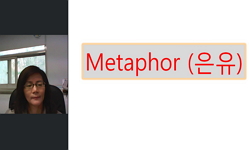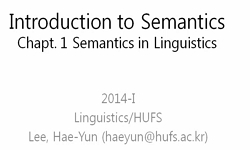This study explores the semantic differences of synonyms, ‘gippeuda’ and ‘jeulgeopda’, which are commonly used to denote ‘a pleasant emotional state’. Their semantic differences are revealed according to eight parameters. ‘Gippeuda’ an...
http://chineseinput.net/에서 pinyin(병음)방식으로 중국어를 변환할 수 있습니다.
변환된 중국어를 복사하여 사용하시면 됩니다.
- 中文 을 입력하시려면 zhongwen을 입력하시고 space를누르시면됩니다.
- 北京 을 입력하시려면 beijing을 입력하시고 space를 누르시면 됩니다.
https://www.riss.kr/link?id=A102203211
- 저자
- 발행기관
- 학술지명
- 권호사항
-
발행연도
2015
-
작성언어
Korean
-
주제어
인지언어학 ; 의미 ; 동의관계 ; 감정 ; 신체화 ; ‘기쁘다’ ; ‘즐겁다’ ; 매개변인 ; 개념적 은유 ; 격틀 ; cognitive linguistics ; meaning ; synonymy ; emotion ; embodiment ; ‘gippeuda’ and ‘jeulgeopda’ ; parameter ; conceptual metaphor ; case frame
-
등재정보
KCI등재
-
자료형태
학술저널
-
수록면
23-49(27쪽)
-
KCI 피인용횟수
4
- 제공처
- 소장기관
-
0
상세조회 -
0
다운로드
부가정보
다국어 초록 (Multilingual Abstract)
This study explores the semantic differences of synonyms, ‘gippeuda’ and ‘jeulgeopda’, which are commonly used to denote ‘a pleasant emotional state’. Their semantic differences are revealed according to eight parameters. ‘Gippeuda’ and ‘jeulgeopda’ have the following differences: First, in terms of motivation, ‘gippeuda’ describes the emotion associated with the accomplishment of a wish, or when a good thing occurs by chance. ‘Jeulgeopda’, on the other hand, refers to the emotion felt during an interesting experience. Second, in terms of objects, ‘jeulgeopda’ is much wider in scope than ‘gippeuda’, its restrictions tending to be neutralized by modifiers rather than predicates. Third, in terms of physical responses, ‘gippeuda’ has a wider application, and its symptoms are more various, intense, and instantaneous than ‘jeulgeopda’. Fourth, in terms of sense organs, ‘gippeuda’ is extrovert, corresponding to ‘maeum (mind)’, while ‘jeulgeopda’ is introvert, and encompasses ‘maeum and mom(body)’ along with the sensory parts of the five sense organs. Fifth, in terms of the experiencer, participation in an antecedent incident is not necessary in the case of ‘gippeuda’, though it essential for ‘jeulgeopda’. Sixth, in terms of metaphoric aspects, ‘gippeum’ is more activating than ‘jeulgeoum’ in the source domain and the number of predicates. Seventh, in terms of parallel vocabulary, ‘gippeuda’ bears opposite, synonymous, and paraphrastic relation to ‘seulpeuda’, ‘bangapda’, and ‘yukwaehada’, while ‘jeulgeopda’ bears similar relations to ‘goeropda’, ‘jaemiitda and heugyeopda’, and ‘yukwaehada’. Eighth, in terms of case frames, ‘gippeuda’ and ‘jeulgeopda’ have subtle differences in the possibility of agent omission.
목차 (Table of Contents)
- 1. 들머리
- 2. ‘기쁘다’와 ‘즐겁다’의 의미 변인
- 3. 마무리
- 참고문헌
- [Abstract]
- 1. 들머리
- 2. ‘기쁘다’와 ‘즐겁다’의 의미 변인
- 3. 마무리
- 참고문헌
- [Abstract]
참고문헌 (Reference)
1 김성화, "형용사 유의어 연구(5): ‘기쁘다/즐겁다’" 한국어문교육학회 26 : 5-33, 2003
2 남영신, "한국어용법 핸드북" 모멘토 2005
3 김정현, "한국어 감정형용사의 유의어 교육 연구 : 고빈도 감정 어휘를 중심으로" 경희대학교 2007
4 정회란, "한국어 '기쁘다' 유사 어휘군의 의미론적 연구" 한국외국어대학교 2007
5 강현화, "중·고급 학습자를 위한 감정 기초형용사의 유의관계 변별 기제 연구 -기쁨·슬픔을 나타내는 형용사의 통합관계를 중심으로-" 한국어의미학회 17 : 43-64, 2005
6 임지룡, "인지언어학 개론" 태학사 2010
7 임지룡, "의미의 인지언어학적 탐색" 한국문화사 2008
8 Murphy, M. L., "의미관계와 어휘사전" 박이정 2003
9 김수업, "우리말은 서럽다" 나라말 2009
10 김창진, "우리말 사랑 135: ‘기쁘다’와 ‘즐겁다’"
1 김성화, "형용사 유의어 연구(5): ‘기쁘다/즐겁다’" 한국어문교육학회 26 : 5-33, 2003
2 남영신, "한국어용법 핸드북" 모멘토 2005
3 김정현, "한국어 감정형용사의 유의어 교육 연구 : 고빈도 감정 어휘를 중심으로" 경희대학교 2007
4 정회란, "한국어 '기쁘다' 유사 어휘군의 의미론적 연구" 한국외국어대학교 2007
5 강현화, "중·고급 학습자를 위한 감정 기초형용사의 유의관계 변별 기제 연구 -기쁨·슬픔을 나타내는 형용사의 통합관계를 중심으로-" 한국어의미학회 17 : 43-64, 2005
6 임지룡, "인지언어학 개론" 태학사 2010
7 임지룡, "의미의 인지언어학적 탐색" 한국문화사 2008
8 Murphy, M. L., "의미관계와 어휘사전" 박이정 2003
9 김수업, "우리말은 서럽다" 나라말 2009
10 김창진, "우리말 사랑 135: ‘기쁘다’와 ‘즐겁다’"
11 김준광, "우리말 바루기 155: ‘기쁘다’와 ‘즐겁다’"
12 이지혜, "심리형용사 유의어의 의미 변별과 사전 기술 연구 : 연어 분석을 중심으로" 연세대학교 대학원 2006
13 임지룡, "말하는 몸: 감정 표현의 인지언어학적 탐색" 한국문화사 2006
14 김수업, "말뜻말맛: ‘기쁘다’와 ‘즐겁다’"
15 김종택, "동의어의 의미평정" 대구교육대학교 6 : 104-108, 1970
16 천시권, "국어의미론" 형설출판사 1971
17 유현경, "국어 형용사 연구" 한국문화사 1998
18 김경원, "국어 실력이 밥 먹여준다: 낱말편1" 유토피아 2006
19 김은영, "감정동사 유의어의 의미 연구-‘즐겁다’, ‘무섭다’의 유의어를 중심으로-" 한국어의미학회 14 : 121-147, 2004
20 가메이 미도리, "韓國語와 日本語의 感情形容詞比較硏究: ‘기쁨’과 ‘슬픔’의 感情形容詞를 중심으로" 중앙대학교 대학원 2015
21 임지룡, "‘기쁨’과 ‘슬픔’의 개념화 양상" 국어학회 37 : 219-249, 2001
22 정회란, "‘기쁘다’ 유사 어휘군의 의미론적 연구" 한국언어문화교육학회 2 (2): 105-130, 2006
23 Firth, J. R., "Studies in Linguistic Analysis, (Special volume of the Philological Society)" Basil Blackwell 1-32, 1957
24 이정목, "NSM을 이용한 한국어 '기쁘다' 류 심리형용사의 의미 분석과 기술" 한국외국어대학교 교육대학원 2008
25 Miller G. A., "Lexical and Conceptual Semantics" Blackwell 197-229, 1991
26 Quine, W. V., "From a Logical Point of View" Harvard University Press 20-46, 1961
27 Jones, S., "Antonyms in English: Construal, Constructions and Canonicity" Cambridge University Press 2012
동일학술지(권/호) 다른 논문
-
- 한국어문학회
- 배혜진(Bae, Hye-jin)
- 2015
- KCI등재
-
- 한국어문학회
- 최형강(Choe, Hyeong-gang)
- 2015
- KCI등재
-
- 한국어문학회
- 권도영(Kwon, Do-young)
- 2015
- KCI등재
-
- 한국어문학회
- 김영호(Kim, Young-ho)
- 2015
- KCI등재
분석정보
인용정보 인용지수 설명보기
학술지 이력
| 연월일 | 이력구분 | 이력상세 | 등재구분 |
|---|---|---|---|
| 2026 | 평가예정 | 재인증평가 신청대상 (재인증) | |
| 2020-01-01 | 평가 | 등재학술지 유지 (재인증) |  |
| 2017-01-01 | 평가 | 등재학술지 유지 (계속평가) |  |
| 2013-01-01 | 평가 | 등재학술지 유지 (등재유지) |  |
| 2010-01-01 | 평가 | 등재학술지 유지 (등재유지) |  |
| 2008-01-01 | 평가 | 등재학술지 유지 (등재유지) |  |
| 2006-01-01 | 평가 | 등재학술지 유지 (등재유지) |  |
| 2004-01-01 | 평가 | 등재학술지 유지 (등재유지) |  |
| 2001-07-01 | 평가 | 등재학술지 선정 (등재후보2차) |  |
| 1999-01-01 | 평가 | 등재후보학술지 선정 (신규평가) |  |
학술지 인용정보
| 기준연도 | WOS-KCI 통합IF(2년) | KCIF(2년) | KCIF(3년) |
|---|---|---|---|
| 2016 | 0.56 | 0.56 | 0.56 |
| KCIF(4년) | KCIF(5년) | 중심성지수(3년) | 즉시성지수 |
| 0.54 | 0.53 | 0.99 | 0.1 |




 DBpia
DBpia







